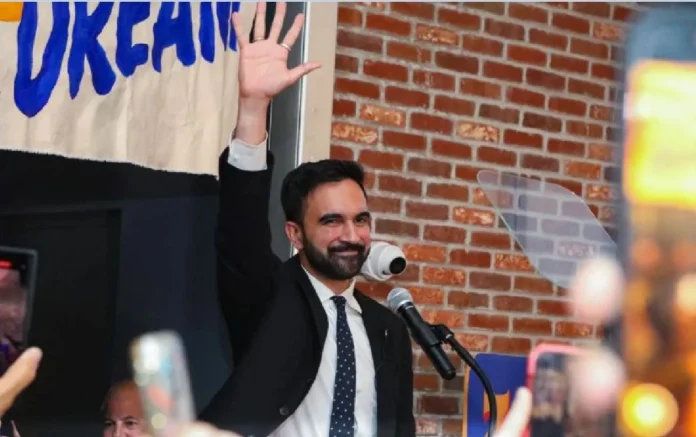By Kenneth Tiven
Zohran Mamdani’s stunning victory in the Democratic primary for mayor of New York City has stirred euphoria among young progressives and a firestorm of opposition from political elites—delivering all the emotional highs and ideological conflict of a feel-good political thriller, minus the Hollywood ending.
At just 33, the Indian-American state legislator pulled off what seemed improbable: unseating former Governor Andrew Cuomo and positioning himself as the Democratic frontrunner in a city where winning the primary often means winning the office. The backlash, however, was immediate and visceral—fuelled not just by Mamdani’s platform, but by who he is.
- He’s a Muslim, born in Uganda.
- He’s young, unflinchingly progressive, and a proud Socialist Democrat.
- He supports Palestinian rights unapologetically.
In polarized America, these identities alone are lightning rods. Add to that Mamdani’s call for rent freezes, free bus service, and higher taxes on billionaires, and you have the makings of both a populist revolution—and a political firestorm.
His upbringing and worldview reflect a unique convergence of artistic and intellectual heritage. His mother, Mira Nair, the internationally celebrated filmmaker, and his father, political scholar Mahmood Mamdani, offered him a transnational lens on justice, identity, and power. His college years at Bowdoin in Maine solidified his progressive ideals. Yet his campaign was won not through lectures or lineage, but shoe leather: walking the boroughs, listening to people, and repeating a simple truth—New York is unaffordable, and it doesn’t have to be.
The Democratic primary had been expected to be Cuomo’s comeback vehicle, a path to redemption for a politician who resigned in disgrace four years ago. With over $25 million pumped in by panicked oligarchs through PACs like Fix the City, Cuomo had the establishment’s full backing. Mamdani, polling in the single digits early on, had limited funds, but limitless energy—and a small army of volunteers, mostly young, diverse, and angry about being priced out of their own city. Even Cuomo acknowledged the force of the insurgent campaign. “He touched young people and he inspired them and moved them… I applaud him sincerely for his effort,” he said after conceding.
Mamdani’s message—affordability, equity, dignity—resonated. Only 22 percent of New Yorkers own cars; most rely on public transport. With bus systems free in 15 US cities, his push for free service and tighter rent regulation was less radical and more realistic than critics claimed. His proposals may face hurdles between city and state rules, but his mere recognition of people’s struggles drew overwhelming support.
Not all of it came easy. The far-right erupted. Donald Trump, true to form, derided him as “a 100 percent Communist Lunatic,” threatening to cut off federal funds to New York if Mamdani wins. His aide Stephen Miller decried Mamdani’s candidacy as the result of “failed migration policy.” Such attacks only strengthened Mamdani’s standing among younger, disillusioned voters.
Mamdani even made inroads in neighbourhoods with significant Jewish populations, despite concerns about his stance on Israel-Palestine. While his support was limited in ultra-Orthodox precincts, he remained competitive in areas with large Black voter bases and pockets of older Democrats disenchanted with party leaders. One Jewish New Yorker wrote online: “He clearly has Jewish friends, grew up with many Jewish people… I don’t think he is antisemitic. But I worry about how his community treats Zionism.”
Mamdani never took the bait. His campaign avoided mudslinging, even against fellow liberals, reserving its fire for systemic injustice. In stark contrast, Cuomo’s camp trafficked in cynical accusations—labelling him antisemitic, radical, dangerous. Mamdani stayed focused. His discipline paid off.
In the final week before the primary, Mamdani walked the entire length of Manhattan, sweating in the summer heat and talking to voters one-on-one. His social media outreach was savvy but unflashy, his messaging clear: rent is too damn high, buses should be free, the rich should pay their share.
Behind the scenes, Mamdani built quiet coalitions. A crucial endorsement from City Comptroller Brad Lander helped tip the scales. With New York’s ranked-choice voting system, Mamdani was many voters’ second or third choice—emerging as the consensus progressive in a fractured field. He hit the public funding cap of $8 million, but stayed focused on policy while Cuomo’s PACs spent triple that.
Current Mayor Eric Adams, dogged by corruption allegations and new alliances with Trump, opted to skip the primary. Now, he plans to run as an independent in November, setting up a general election battle that could be as volatile as the primary was stunning.
If Mamdani wins in November, he’ll join Bernie Sanders and Alexandria Ocasio-Cortez as standard bearers of a newly emboldened progressive left—one that believes moral clarity and economic fairness can, in fact, win elections.
For many, Mamdani represents a different kind of politics: one of accessibility, optimism, and principle. In a city known for hard edges and cynical operators, that may be the most radical thing of all.
PARENTS AND POLITICAL PEDIGREE: A LEGACY OF IDEAS AND ART
Zohran Mamdani’s rise is steeped in intellectual and creative influence. His mother, Mira Nair, is an acclaimed Indian-American filmmaker known for Monsoon Wedding, Mississippi Masala, and The Namesake, films that deftly explore identity, migration, and injustice. His father, Mahmood Mamdani, is a revered Ugandan academic and political theorist whose work dissects the roots of power and resistance in post-colonial societies. Raised in a household of critical thought and global awareness, Mamdani’s politics bear the imprint of both cinematic storytelling and political theory—justice with nuance, radicalism with compassion.
—The writer has worked in senior positions at The Washington Post, NBC, ABC and CNN and also consults for several Indian channels


